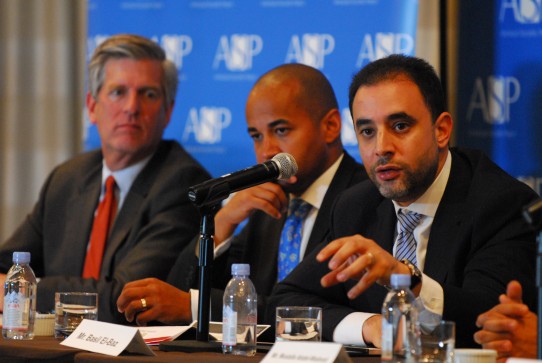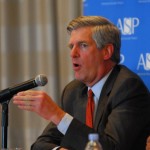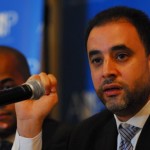
U.S.–Egypt Strategic Relations: Investment Climate and Entrepreneurship
On Wednesday, May 7th, 2014 leaders from the public and private sector in both the United States and Egypt joined together in Washington, DC to discuss the shifting nature of Egypt on a regional and international focus. These individuals specifically focused on the country’s partnership with the United States.
Panel 3: Investment Climate and Entrepreneurship
 The third and final panel of the day, Investment Climate, and Entrepreneurship, discussed the key economic changes Egypt will need to go through, as well as the future of business and growth sustainability.
The third and final panel of the day, Investment Climate, and Entrepreneurship, discussed the key economic changes Egypt will need to go through, as well as the future of business and growth sustainability.
Egypt is the largest economic market in the Middle East, with over 90 million people. An open and competitive economy, a politically stable government, and the potential for investment from nations around the world will be key in the growth and sustainability of Egypt.
The distinguished panelists included Nelson Cunningham, Dante Disparte, Khush Chosky, and Basil El Baz.
Dante Disparte set the tone for the discussion by saying no matter where you stand politically, economics will punish you. Egypt must establish a pathway forward that encourages investment and creates jobs. The driver behind Egypt’s way forward is small and medium enterprises (SMEs).
According to Basil El Baz Egypt has the basic fundamentals to provide jobs, but lacks investment and the economic reforms to facilitate growth. His solution is to increase education on entrepreneurship on a wide scale to promote the development of SMEs, something the United States could easily partner with. Being a successful Egyptian entrepreneur himself, whose company is now the largest investor in post-revolutionary Egypt, El Baz challenges the concept that Egypt is hard to work in. His projects, having been developed in a complicated market, established a well-balanced structure that allows his company to flourish.
 El Baz believes Egypt has the proper model to develop a highly efficient economy. Using an anecdote about South Korea modeling their system after Egypt decades ago, El Baz stresses that Egypt simply needs to make the proper decisions to ensure that their own model works. El Baz said, “Through reform, through structure you can establish practically any economic goal” as the South Koreans did, who now have a highly developed economy.
El Baz believes Egypt has the proper model to develop a highly efficient economy. Using an anecdote about South Korea modeling their system after Egypt decades ago, El Baz stresses that Egypt simply needs to make the proper decisions to ensure that their own model works. El Baz said, “Through reform, through structure you can establish practically any economic goal” as the South Koreans did, who now have a highly developed economy.
Mustafa Abdel-Wadood, however, reminds us of the set of harsh realities in Egypt – political transition, unemployment, and lack of investment – that only hinder long-term challenges such as growth, employment, and education. Egypt has deteriorated over the past few years and remains an uncertain market. Khush Choksy lists 5 economic issues that must change for Egypt to move forward and encourage investment: (1) a comprehensive economic policy must be enacted, (2) there must be a reform in the bureaucracy, (3) a genuine public- private sector dialogue must take place, (4) business best practices must be instituted, and (5) there should be a government-to-government dialogue between Egypt and the U.S.
Despite the challenges ahead and the tone presented in the media, each panelists remains fervently optimistic about the future of Egypt. Basil El Baz described discipline as one of the main keys to Egypt’s success and he believes that with discipline you can navigate through any turbulent time.
Created with Admarket’s flickrSLiDR.






[…] of January 2011, one area that requires immediate attention and substantial transformation is the Egyptian economy. A lack of economic progress coupled with systemic unemployment has crippled Egypt and its younger […]
[…] in regional and global affairs. As it works towards these ends, other nations will take note of Egypt’s potential. There is considerable opportunity for investment in business initiatives, financial markets and […]